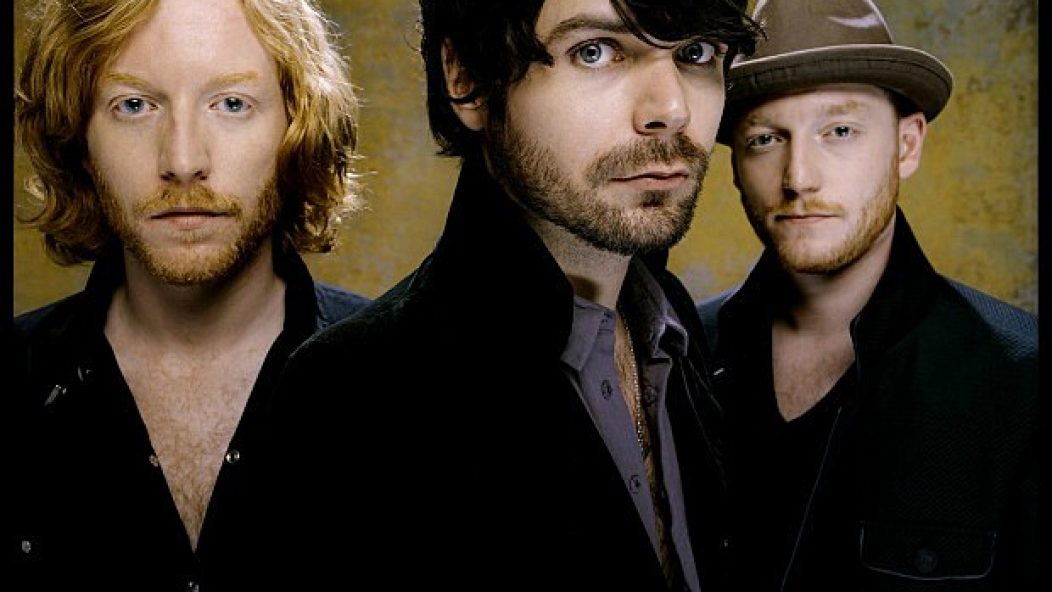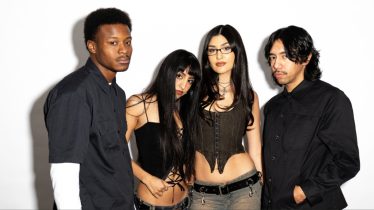
In The Studio: Biffy Clyro's Simon Neil on kazoos and their forthcoming double album
Nearly three years have passed since the release of Only Revolutions, and Scottish band Biffy Clyro are more than ready for fans to hear new music. AP caught up with frontman Simon Neil to discuss the band’s early-2013 release (and their sixth studio album), Opposites—a double album that not only takes chances with modern music-consumer habits but sonically, as well (think: mariachi bands and kazoos).
Interview: Rachel Lux
The recording process is in the final stages, right?
SIMON NEIL: Yeah, we’re close. We’ve got another two weeks of mixing to go. It’s been quite a long haul. We spent about four months recording in the Village Studios in Santa Monica, California, with Garth Richardson, who worked on our last two records. It’s been great fun; we love being in the sunshine. [Laughs.] We like to leave Scotland when we’re recording so we’re not just stuck inside all the time.
Is there anything specific you’re focusing on with the last bit of mixing, or is it more technical finishing touches?
No, we try to keep away from the technical aspects. We know what we like to hear, but I think it’s important when you’re in a band to judge the feeling of [the music] and how it makes you feel and whether it hits those spots for you. So for me, the hard work is really done when we’re doing the recording, and the mixing’s a bit easier, because you just get to hear the product of your hard work.
We do have some interesting additions to some songs on this record. We’ve got a mariachi band on a song, and we’ve got a tap dancer on another, so it’s been interesting to try to mix those things. We’ve got kazoos—almost a kazoo symphony I would say, on a song. We’ve been moving forward to complete this kind of large-scale rock record. And this one, with it being a double record, we’ve just gone over the top as [much as] we can. Any kind of fun idea that we had, we followed. And 90 percent of the time, it’s worked out, so it’s been going really well. It’s still definitely a rock record; there are still really heavy moments. But I think we’ve gone slightly weirder. We just decided to go down as weird a path we can. It’s exciting. It definitely feels like this is as far as we can push this side of our band. So I think after this record, we will go through a reassessment of how we can work on our albums. But it feels good so far. We are really buzzing for people to hear it.
It makes sense that you can push the limits on a double album when you have a few more tracks to work with. And it’s an ambitious choice at a time when many listeners often only buy one song at a time.
Yeah, I think we’re trying to do it kind of old-school. Not react against the way music is consumed now, but we do want to make something that really is a full piece of music. You have to kind of invest yourself in it. Quite often people’s connections to bands—sometimes feels more and more shallow because people are only digging one or two songs by a band. But to me, I love to fall in love with every aspect of a band. And when we imagine people listening to our band, we want it to take over. [Laughs.] I’m sure every band wants to, but we definitely want to embrace the old-school way of looking at it, and really making a piece of art that people can get to know, and it becomes a companion for years, hopefully. We want to make music that people still listen to in 10 years and they go back to, and just have a favorite record, rather than just a song that you like for a week. It’s kind of opposite of why we make music. It should be entertainment, but it should also be hopefully a life-long friend. It’s what all the best bands do. That’s what we hope to achieve.
During recording, you set up a live-streaming web cam, dubbed “BiffyCam.” Why did you decide to broadcast what was happening in the studio?
I think there were a couple reasons. We had six or seven months off when we were getting the record together and waiting for Garth to finish with a couple of other albums so we could start to record. So one thing was to let people know what stage we were at in terms of making the record—that we weren’t sitting around, twiddling our thumbs. And also, I think when I was younger, I would’ve loved to have seen how a record was made. I think we just wanted to give a glimpse into how we were making this album, basically, and to say thanks to people for having patience with us. We wanted them to see hopefully the honesty in what we’re doing…To want other people to get involved and come and see your band and start to dig your band—you’ve got to care about it more than anyone. I think it was important to represent how much work we’ve spent on it. And also to just kind of see it as fun. Sometimes you can make a record that’s quite intense, and some days you want to just burst into tears, and some days you’re just having the best day you’ve ever had, so I think it’s also important that people can see the highs and lows of it. But primarily, it’s hopefully to show people they can do it, too. [Laughs.] So hopefully it was a treat for people. We were kind of on our best behavior, I have to say. [Laughs.]
You’ve released one song already, “Stingin’ Belle.” What exactly is a “stinging belle”?
The stinging belle, to me, is kind of a woman scorned. [Laughs.] It’s kind of an anti-love song. It’s describing those moments where you’re just wanting to make things better, and I sometimes feel like I can’t do that because of my limitations or [because I’m] not fully understanding and grasping certain things in life. And it’s about wanting to be there for things—it’s wanting to do the best I can, but basically my shortcomings show through in doing that. I think musically, it’s a good idea of where the record’s going in terms of the scale of it. It’s got bagpipes on it, which is a bit ridiculous. [Laughs.]
The song has a nice contrast between the rapid-fire guitar and drums, and the vocals being a lot more mellow.
That’s exactly what we wanted: the duality of the anger and as always the pop melodies, because that’s what we’ve always loved in music, right from when we were very young. Even when we were going through a Lightning Bolt phase and were listening to really abrasive noise music, we still always loved bands like Weezer. It’s so important even when music sounds so brutal, that is should have some kind of beauty in it. If it’s brutal all the time, it becomes boring. If it’s gorgeous all the time, it becomes boring. We sometimes like to just bounce between beautiful and ugly.
Did you see a central theme emerge as you were writing?
It’s our sixth album with the band, and we’ve been through a lot together. Myself, Ben [Johnston, drums] and James [Johnston, bass] have been friends since we were 6 years old. There are moments where you drift apart and things change. For the first time in the last couple years, it started to feel like we’d maybe started to drift apart a bit. I think the first disc on the record is kind of about those moments, where you just think, “Fuck it. Why am I bothering?” It’s easier to just not do certain things. Not all related to the band, but sometimes it’s easier to just walk away from things and take the easy way out because some days you can’t face the challenge of certain things.
So the first [disc’s] got quite a negative way of looking at those things, like, “Oh, I’ll do it myself,” or “I don’t need help.” And the second disc is the exact opposite of that. It’s like we have to stick together, and we can get through any problems as long as we stick together. Especially being in a band—things kind of go away at a certain point, and it’s so easy to forget why you’re doing it in the first place. I don’t ever want us to forget that we’re best friends doing it.
Musically, you’ve mentioned some things that you’re doing quite differently, with the mariachi band and kazoos and tap dancers. How do you keep it fresh for yourself or how does Garth challenge you, since you have worked with him before?
I think the challenge just comes in trying to write better songs. And we always want to be a rock band. We’d like to make sure all of our songs—no matter how they sound on the record—they should all work with the three of us playing in our practice room. And that’s kind of the only rule we apply. I’ve always liked the way Jack White talked about that with the White Stripes. The limitations sometimes can make you do great things. The fact that our music has to work with the three of us playing, it doesn’t matter so much where it goes after that. We’re not a band who write songs in the studio. We like to do unseen, and that’s why we work in Scotland, and stay away from any kind of record company nonsense because it’s the enemy of creativity, really. The last thing you want to be worrying about when you’re writing a song is someone saying, “Oh, will it work for radio?” or something like that. That’s just the worst possible thing you can hear.
I’m not sure how we always keep it fresh. I hope we do keep it fresh, but I think we do it by being honest with ourselves, too. I’m 32, and I couldn’t write the same songs I could when I was 25 or when I was 19. I think that’s how we keep it as new and fresh as possible, because I genuinely feel we are honest in every record we make, and we’re representing ourselves in that moment in time. We’re not up for retreading old ideas, and sometimes that annoys our older fans because they want to see a return to our earlier records. But unfortunately, it’s just not honest to do that. It’s not real to do that. We are different people, and it’s basically about being true to yourself. ALT







